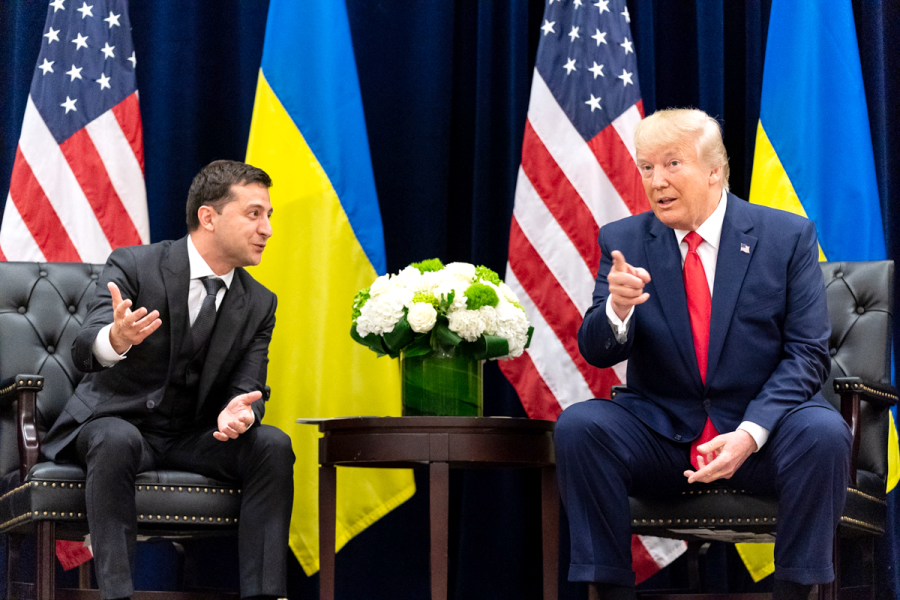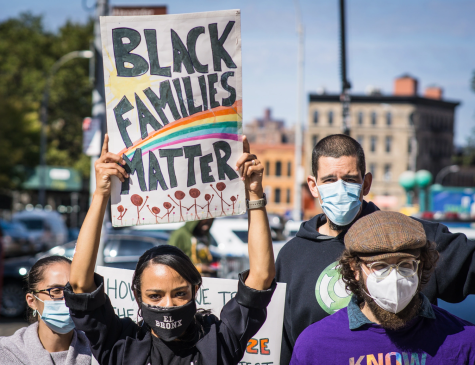We are a republic, but can we keep it?
November 21, 2019
Since the momentous night of the 2016 election, many Americans have longed for President Donald Trump’s impeachment. Throughout his campaign for president and now presidency, he has faced numerous allegations which is unbecoming of a president. Now, the country is in turmoil, awaiting the fate of Trump’s presidency.
Officially, we are two weeks into the public hearings in the impeachment inquiry of Trump, which the House Intelligence Committee launched last Wednesday, Nov. 13. Chairman of the Intelligence Committee, Rep. Adam B. Schiff opened the first day of the public hearing stating that the purpose of the hearings is to determine if Trump abused presidential power by bribing an ally into interfering in a future election.
William B. Taylor Jr., the top United States diplomat in Ukraine was among the first to testify about Trump’s strategy to pressure the Ukraine into investigating his political rival Joseph Biden and his son Hunter Biden. In his testimony, he noted that it was clear understanding that Trump will withhold military aid to Ukraine unless they did what he asked them to do.
“That was my clear understanding, security assistance money would not come until the President [of Ukraine] committed to pursue the investigation,” Taylor said in the deposition.
Rep. Jim Jordan, a fierce ally of team Trump disputed Taylor’s claims of his clear understanding that there was a connection between aid being released to the Ukraine and the soliciting of foreign interference into the Bidens. He shared the three meetings that took place between Taylor and Ukraine President Volodymyr Zelensky following the phone call, in which he claimed there was never a linkage between the aid and investigation.
“Now, with all due respect, Ambassador, your clear understanding was obviously wrong because it didn’t happen,” Jordan said challenging Taylor.
Among the testimony, new revelations emerged regarding the notorious July 25 phone call with Ukraine. Taylor admitted that a member of his staff overheard a phone call between Trump and Gordon Sondland, top ambassador to the European Union on July 26. The nature of the phone call was described as Trump inquiring about the “investigations” into his political rival. The staffer was later revealed to be David Holmes, who will testify Thursday, Nov. 21.
“A member of my staff could hear President Trump on the phone asking Ambassador Sondland about the investigation. Ambassador Sondland told President Trump that the Ukrainians were ready to move forward,” Taylor recounted. “Following the call with President Trump, the member of my staff asked Ambassador Sondland what President Trump thought about Ukraine. Ambassador Sondland responded that President Trump cares more about the investigations of Biden.”
Taylor’s testimony served as the centerpiece for the hearings in the ongoing impeachment probe. He painted a clear picture of the misconduct by Trump. Although he was not a witness when the proposed quid pro quo was taking place, the diplomat spoke with several aides directly aware of the situation, making him rightfully credible.
Throughout the process, Taylor never refrained from the facts at hand. He remained steadfast on focusing on Trump’s misconduct with Ukraine.
Based on the first week of the congressional hearings, it is clear to the world how the Republicans intended to play defense. Their defensive strategy seemed to be debunking claims of officials who were not directly knowledgeable of Trump’s conduct.
In the second week of the public hearings, several key witnesses appeared before the House on Tuesday, Nov. 19. In the morning, Jennifer Williams, aide to Vice President Mike Pence and Lt. Col. Alexander Vindman, member of the National Security Council testified. They are the first White House officials to willingly come forward in public to testify.
Williams and Vindman are among the staffers who listened in on the phone call between the POTUS and Ukrainian president. Williams emphasized the she found the phone call “unusual” because the conversation was concerned with a domestic political matter.
Vindman stated that he was concerned with the phone call and felt that the nature of the call was “inappropriate”. This matter prompted Vindman to report his concerns to officials higher in the chain of command, claiming he did it out of a “sense of duty”.
“It is improper for the president of the United States to demand a foreign government investigate a U.S. citizen and political opponent,” Vindman said in opening statement regarding the Trump’s call with the Ukraine.
As an official who had direct knowledge of conversation between Trump and Zelenksy, he provided the Democrats confirmation of the bribery.
Following the morning deposition, Kurt Volker, former U.S. special envoy to Ukraine and Timothy Morrison, National Security Council official testified in the afternoon. Both of the men were hand-selected by the Republicans to serve as a witness in support of Trump. Surprisingly, Volker’s testimony was not helpful in supporting their case, refuting claims that Biden acted inappropriately with regard to Ukraine.
Volker testified that he didn’t find the allegations credible. The accusation of Biden acting inappropriately was a major argument by the Republicans, making a case for why it was justifiable for Trump to request Ukraine to investigate Biden.
The most damning testimony so far in the public hearings has come from Sondland. Sondland testified on Wednesday, Nov. 20, in which he essentially threw the administration under the bus, stating “everyone was in the loop” and “it was no secret”. In his opening statement, the ambassador implicated many senior officials, including the Vice President, Secretary of State Mike Pompeo and directly accused Trump of aiming to establish a quid pro quo with Ukraine.
“Was there a quid pro quo?,” Sondland said in his opening statement. “The answer is yes.”
If people are still uncertain if there was misconduct by Trump and his administration, Sondland’s jaw-dropping testimony provided everyone the answers. He is a key witness in the probe who was directly involved in the quid pro quo and provided the Democrats a headway in the impeachment hearings.
Given the testimonies by several witnesses privy to the situation, it is most likely that the House will unequivocally impeach Trump. However, the question remains unanswered if the Senate will convict.
In the opening statement of the hearings, Schiff referenced a vital Benjamin Franklin quote that has everything to do with the current political climate today.
On the final day of the Constitutional Convention, Americans asked the Founding Fathers what form of government did they create. Benjamin Franklin responded, “A republic, if you can keep it.” This statement still carries weight 232 years later.
The impeachment inquiry of Trump is a defining moment in U.S. History and demonstrates that as citizens, we must do our due diligence in holding our leaders in government accountable and assert that no one is above the law, including the president.
But if we condone misconduct that ultimately threatens the exact principles inscribed in the Constitution, where does this leave us?
















